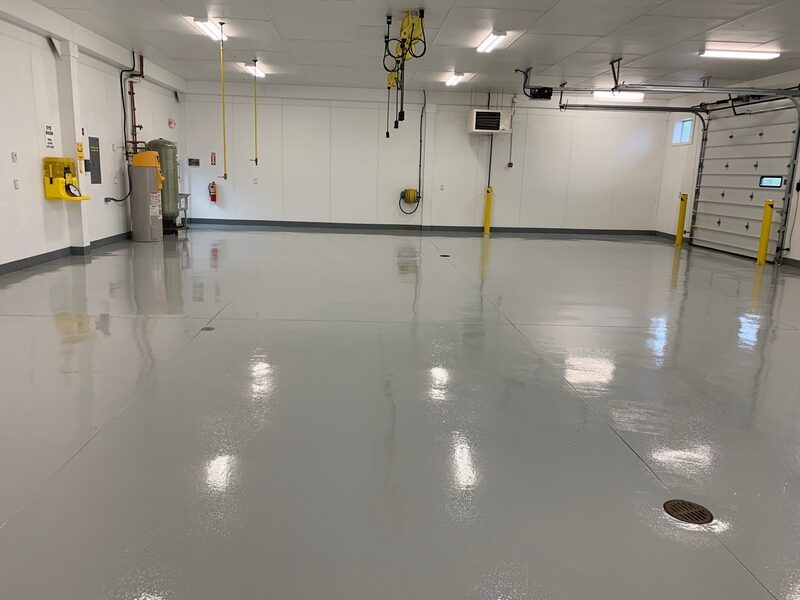Which is Right for You?
Table of Contents

When it comes to selecting flooring for a home or business, there are numerous options to choose from. However, in recent years, epoxy flooring has gained popularity due to its unique properties and advantages over traditional flooring options.
In this blog post, we will compare epoxy flooring with traditional flooring options and help you determine which one is right for you.
What is Epoxy Flooring?
Epoxy flooring is a type of flooring made by mixing resin and hardener, creating a strong and durable material. This type of flooring is commonly used in commercial and industrial settings due to its durability, easy maintenance, and aesthetic appeal. Epoxy flooring is also used in residential settings, particularly in areas with high traffic, such as garages, basements, and laundry rooms.
Advantages of Epoxy Flooring
One of the most significant advantages of epoxy flooring is its durability. It is highly resistant to impact, chemicals, stains, and abrasions. This makes it an ideal option for industrial and commercial settings where there is heavy foot and vehicle traffic. Epoxy flooring is also easy to maintain, requiring only periodic cleaning with soap and water.
Another advantage of epoxy flooring is its aesthetic appeal. It is available in a variety of colors and finishes, including metallic, matte, and glossy. This allows for customization to match the design and style of your space. Epoxy flooring also has a seamless surface, which makes it easy to clean and maintain.
Traditional Flooring Options
While epoxy flooring offers many advantages, traditional flooring options such as carpet, hardwood, and tile have their own set of benefits. Let’s take a closer look at each of these flooring options.
Carpet
Carpet is popular for residential settings due to its warmth and comfort. It is available in a variety of styles and colors, making it easy to match the décor of your space. A carpet is also a good option for sound insulation, reducing noise in high-traffic areas. However, carpet is not as durable as other flooring options and can easily stain or tear.
Hardwood
Hardwood flooring is a classic option for residential settings. It offers natural beauty and durability, making it a popular choice for busy areas. Hardwood flooring is easy to clean and maintain, requiring only periodic cleaning and refinishing. However, hardwood flooring is not as resistant to water and stains as epoxy flooring and can be easily damaged by high heels and furniture.
Tile
Tile flooring is a popular choice for kitchens, bathrooms, and other areas with high humidity due to its moisture resistance. It is also highly durable and easy to clean, making it an ideal option for damp locations. Tile flooring is available in a variety of colors and styles, allowing for customization to match the design of your space. However, tile flooring can be cold and hard on the feet, making it less comfortable than other options.
Which Flooring Option is Right for You?
When selecting flooring, it is crucial to consider your specific needs and preferences. If you want durability, easy maintenance, and aesthetic appeal, epoxy flooring may be the right option. However, if you prefer the warmth and comfort of carpet or the natural beauty of hardwood, these traditional flooring options may be a better fit.
It is also essential to consider the location of your space. Epoxy flooring is an ideal option for commercial and industrial settings due to its durability and easy maintenance. In residential settings, it is commonly used in areas with high traffic, such as garages, basements, and laundry rooms.
FAQ
Where is epoxy flooring commonly used?
Epoxy flooring is commonly used in commercial and industrial settings due to its durability and easy maintenance. In residential settings, it is commonly used in areas with high traffic, such as garages, basements, and laundry rooms.
What are some types of epoxy?
There are different types of epoxy, such as clear, colored, self-leveling, metallic, and UV-resistant epoxy, among others. Each type has its own unique characteristics and applications.
How do I use epoxy?
To use epoxy, mix the resin and hardener together in the right proportions and apply the mixture to the surface you want to bond or coat. Follow the manufacturer’s instructions carefully and use appropriate safety equipment such as gloves and goggles.
How do I prepare the surface for epoxy?
The surface must be clean, dry, and free of dust, oil, and other contaminants. You may need to sand or etch the surface to create a rough texture that allows the epoxy to adhere better. Follow the manufacturer’s instructions for surface preparation.
How long does it take for the epoxy to cure?
The curing time of epoxy depends on several factors, such as temperature, humidity, and the type of epoxy used. Typically, epoxy takes several hours to cure, but a complete cure may take several days.
Key Takeaways
- Epoxy flooring is a durable, easy-to-maintain option for high-traffic commercial and residential settings.
- Traditional flooring options such as carpet, hardwood, and tile have their own benefits and drawbacks and should be selected based on specific needs and preferences.
- A carpet offers warmth and comfort but may stain or tear easily.
- Hardwood offers natural beauty and durability but can be easily damaged by water and stains.
- Tile offers moisture resistance and durability but can be cold and hard on the feet.
- The best flooring option for you depends on your specific needs, preferences, and the location of your space.
- Epoxy has several benefits, such as its strength, versatility, resistance to chemicals, impact, and heat, and is commonly used in construction, manufacturing, automotive, marine, and DIY projects.
